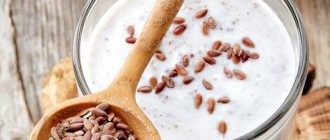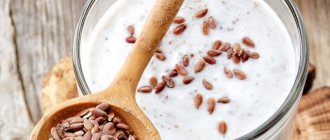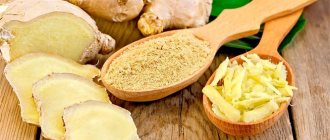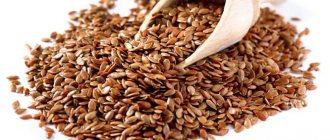In this article we will tell you:
- Composition and main beneficial properties of flaxseed
- The benefits of flax for the intestines
- Indications and recommendations for colon cleansing with flax seeds
- Contraindications to flax consumption
- Possible complications from eating flax
Flaxseed is a plant food that contains healthy fats, antioxidants and fiber. Some people call it a “functional food,” which means a person can add flax to their diet to improve their health.
But the fact that flax seeds are beneficial for the body has been known for a long time. Hippocrates also advised taking them for digestive problems and inflammation of the gastric mucosa.
What are the benefits of flaxseeds and can they be harmful to humans?
Composition and main beneficial properties of flaxseed
People grew flax as a crop in ancient Egypt and China. In Asia, the seeds have played a role in Ayurvedic medicine for thousands of years. Today, flaxseeds are available in the form of oils, powder, tablets, capsules and flour.
The healing properties of flax seed are due to its rich and rich composition. 100 grams of product contains up to 20 g of protein, over 27 g of dietary fiber and more than 42 g of fat.
Despite the high nutritional value, the calorie content of one tablespoon of grains is only 40 Kcal, so flax seeds are beneficial for the body of people trying to lose excess weight. When consumed internally, they provide long-lasting satiety and help cope with the habit of overeating.
A tablespoon of ground flax weighing 7 g contains
:
- calorie content: 37.4;
- proteins: 1.28 g;
- fat: 2.95 g;
- carbohydrates: 2.02 g;
- fiber: 1.91 g.
The table below shows the nutritional content (vitamins and minerals) per 100 grams of edible portion.
| Vitamins | Quantity |
| Lutein + Zeaxanthin | 651 mcg |
| Vitamin B1, thiamine | 1.644 mg |
| Vitamin B2, riboflavin | 0.161 mg |
| Vitamin B4, choline | 78.7 mg |
| Vitamin B5, pantothenic | 0.985 mg |
| Vitamin B6, pyridoxine | 0.473 mg |
| Vitamin B9, folates | 87 mcg |
| Vitamin C, ascorbic acid | 0.6 mg |
| Vitamin E, alpha tocopherol, TE | 0.31 mg |
| Gamma Tocopherol | 19.95 mg |
| Delta Tocopherol | 0.35 mg |
| Vitamin K, phylloquinone | 4.3 mcg |
| Vitamin RR, NE | 3.08 mg |
| Betaine | 3.1 mg |
| Macronutrients | |
| Potassium, K | 813 mg |
| Calcium, Ca | 255 mg |
| Magnesium, Mg | 392 mg |
| Sodium, Na | 30 mg |
| Sera, S | 182.9 mg |
| Phosphorus, P | 642 mg |
| Microelements | |
| Iron, Fe | 5.73 mg |
| Manganese, Mn | 2.482 mg |
| Copper, Cu | 1220 mcg |
| Selenium, Se | 25.4 mcg |
| Zinc, Zn | 4.34 mg |
The beneficial properties of flax are due to the high percentage of the following vitamins and minerals in the daily intake:
: vitamin B1 - 109.6%, choline - 15.7%, vitamin B5 - 19.7%, vitamin B6 - 23.7%, vitamin B9 - 21.8%, vitamin PP - 15.4%, potassium - 32.5%, calcium - 25.5%, magnesium - 98%, phosphorus - 80.3%, iron - 31.8%, manganese - 124.1%, copper - 122%, selenium - 46.2%, zinc - 36.2%
Vitamin F is actively involved in fat and cholesterol metabolism. It is not synthesized in the body, which is why it is so important to get it from food. Vitamins A and E are also called “vitamins of youth”. They have a positive effect on skin cells. Therefore, flax seeds are not only used for effective weight loss and cleansing of the body, but they are used in the manufacture of many cosmetics.
As a source of selenium, flax seeds prevent the development of tumors, cleanse the body well of heavy metal salts, and help improve visual and brain activity of the body.
Also, the seeds are real record holders for the content of plant hormones (lignans), which have antiviral and antioxidant effects.
According to some research, flaxseed may be more than 800 times richer in lignans than most other foods.
Study
: Flaxseed Supplementation (not Dietary Fat Restriction) Reduces Prostate Cancer Proliferation Rates in Men Presurgery, Beyond Fish Oil Supplementation: The Effects of Alternative Plant Sources of Omega-3 Polyunsaturated Fatty Acids upon Lipid Indexes and Cardiometabolic Biomarkers—An Overview
The particular benefit of flax seeds is their high oil content, rich in unsaturated fatty acids. Since these acids cannot be independently synthesized in the body, their supply from the outside is considered extremely important for humans.
The three most common fatty acids that are part of the omega-3 group are ALA, EPA and DHA. Alpha-linoleic acid (ALA) is mainly found in plant foods. In its original form, our body uses this acid as ordinary fat, that is, as a source of energy.
To provide the greatest benefit, ALA must be converted into two other acids: EPA (eicosapentaenoic acid) and DHA (docosahexaenoic acid). Approximately only 5% of ALA is converted to EPA, while less than 0.5% is converted to DHA in humans
Therefore, consuming fatty fish as a source of EPA and DHA will be more effective than consuming flaxseed oil.
Flax seeds
– an excellent source of plant fiber, which helps reduce the risk of cancer and strengthens the body’s immunity. Polysaccharides (dietary fiber) contribute to an effective effect on the gastrointestinal tract.
A selection of studies proving some of the benefits of flax seeds in correcting health conditions.
Reducing the risk of cancer
Flaxseed contains omega-3 fatty acids. Research suggests they play a role in preventing the development of various types of cancer cells.
Study
: Omega-3 Fatty Acids and Cancer Cell Cytotoxicity: Implications for Multi-Targeted Cancer Therapy
Lignans, which are antioxidants that can keep tumors from growing by preventing them from forming new blood vessels.
We recommend
“Vitamin content in apples: calorie content, health benefits, contraindications” Read more
One 2013 study found a lower incidence of breast cancer among women who regularly consumed flaxseed.
Study
: Flaxseed Supplementation (not Dietary Fat Restriction) Reduces Prostate Cancer Proliferation Rates in Men Presurgery, Consumption of flaxseed, a rich source of lignans, is associated with reduced breast cancer risk, What to know about breast cancer
Additionally, in 2022, the authors of another study concluded that flaxseed may help reduce the risk of breast cancer after menopause.
Lignans are a type of phytoestrogens, which is a plant nutrient that acts in the same way as estrogen. There has been concern for some time that phytoestrogens may increase the risk of breast cancer, but recent research suggests they may play a protective role.
Study
: The Effect of Flaxseed in Breast Cancer: A Literature Review, Effects of phytoestrogens on the activity and growth of primary breast cancer cells ex vivo
Improved lipid profile and cardiovascular system status
Recommends eating the right amount of fiber and omega-3 to maintain cardiovascular health.
Study
: Dietary lignans: physiology and potential for cardiovascular disease risk reduction
Flax also contains phytosterols. Phytosterols have a similar structure to cholesterol and help prevent the absorption of cholesterol in the intestines. Consuming phytosterols can therefore help lower the levels of low-density lipoprotein (LDL), or “bad” cholesterol, in the body.
A 2010 study looked at the effect of flaxseed on the cholesterol levels of men with moderately high cholesterol. Participants took capsules containing 20 mg and 100 mg of lignans, or a placebo, for 12 weeks.
Cholesterol levels dropped after taking lignans, especially in those taking 100 mg.
A 2012 study of 17 people found that eating flaxseed lowered LDL cholesterol and helped the body reduce fat, although they noted that overall diet may also play a role. The team suggested that dietary flaxseed may be beneficial for lowering cholesterol levels.
Study
: Phytosterols and cholesterol metabolism, Flaxseed dietary fibers lower cholesterol and increase fecal fat excretion, but magnitude of effect depends on food type
Relieving Arthritis Symptoms
According to the Arthritis Foundation, flaxseed may help reduce joint pain from rheumatoid arthritis.
Study
: Supplement and Herb Guide for Arthritis Symptoms
There is no significant evidence to support its use for this purpose, but it does state that the ALA in flaxseed may help reduce inflammation.
Reducing tides
In 2007, a group of scientists published results suggesting that flaxseed may help reduce the incidence or severity of hot flashes in women not using estrogen therapy during menopause.
We recommend
“The benefits of turmeric for the face: recipes for masks and drinks” Read more
Increased blood sugar levels
Lignans and other phytoestrogens may help reduce the risk of chronic diseases such as diabetes.
In a 2013 study, 25 people took 0g, 13g, or 26g of flaxseed every day for 12 weeks. Participants included people with prediabetes, obese or overweight men, and women who had gone through menopause.
Study
: Daily flaxseed consumption improves glycemic control in obese men and women with pre-diabetes: a randomized study
They concluded that the 13 g dose may reduce glucose and insulin levels and improve insulin sensitivity, but other doses do not have this effect.
Additionally, a 2016 rodent study found that compounds in flaxseed may help reduce the incidence of type 1 diabetes and delay the onset of type 2 diabetes. However, these results may not be applicable to humans.
That same year, 99 people with prediabetes took 40g or 20g of flaxseed for 12 weeks.
Study
: Flaxseed and Diabetes, The effect of flaxseed powder on insulin resistance indices and blood pressure in prediabetic individuals: A randomized controlled clinical trial
Consuming flaxseed may lower blood pressure, but it does not improve blood sugar levels or insulin resistance, so the benefits of flaxseed on diabetes symptoms remain unclear.
Preventing constipation
Flaxseed is a good source of insoluble fiber. In the intestines, the seed absorbs water and adds bulk, which can promote bowel regularity.
However, the National Center for Complementary and Integrative Health (NCCIH) says there is little evidence that flaxseed helps relieve constipation.
Study
: Flaxseed and Flaxseed Oil
The NCCIH adds that consuming flaxseed with insufficient water intake can worsen constipation and lead to intestinal obstruction.
Additionally, too much flaxseed or flaxseed oil can cause diarrhea.
Reducing exposure to radiation
In 2013, scientists found evidence that dietary lignans from flaxseeds helped mice recover from radiation exposure.
Study
: Radiation mitigating properties of the lignan component in flaxseed
Mice that consumed lignans had lower levels of inflammation, injury, oxidative damage and fibrosis, as well as better survival rates, compared to those that did not.
Further tests in humans show similar results: lignans from flaxseed may help treat lung problems after exposure to radiation or radiotherapy.
Targeted nutrition tips
that will increase your energy level by 10 out of 10
From TOP nutritionists of the MIIN
Get tips
Thus, adding flax seeds to your diet may have the following health benefits:
:
- Normalization of lipid metabolism.
- Boosting immunity.
- Improved blood circulation.
- Normalization of the digestive system.
- An additional source of micro and macroelements, vitamins and healthy fats.
- Increasing endurance and rapid recovery of the body after intense physical exertion.
- Thanks to the high content of vitamins A and E - maintaining beauty, correcting a number of age-related manifestations, incl. strengthening regenerative functions.
- It has a laxative effect and enhances metabolic processes, so it is actively used for weight loss.
- Oncoprotective.
- Providing anti-inflammatory effects.
- Normalization of the cardiovascular system
NCCIH is currently funding research to find out if the nutrients in flaxseed can actually help with the following diseases
:
- ovarian cancer;
- cardiovascular diseases;
- metabolic syndrome;
- diabetes;
- asthma;
- inflammation.
Study
: Flaxseed and Flaxseed Oil
The use of flax as an additional remedy to the main treatment of the health conditions presented above will have a positive effect.
Reviews
Cleaning with flax seeds is a completely affordable, safe and effective remedy. If you follow the requirements and recommendations, you can achieve positive results. This is evidenced by numerous reviews of people who have tried the effect of the cocktail, where the main ingredient is seeds.
The effectiveness of a cocktail with kefir for weight loss is especially noted. The drink has a positive effect on the intestines, helping to remove fecal matter, acting gently, unlike medications from the pharmacy. Allows the body to independently cope with chronic stool disorders.
Patients note the pleasant taste of the product. When honey or cinnamon is added, the drink becomes very tasty. At the same time, weight decreases and the condition of the skin improves. Youth returns to the skin.
Women going through menopause take the cocktail to relieve stress and nervous tension. Blood pressure returns to normal, joints become mobile, and pain decreases.
The benefits of flax for the intestines
One of the functions of the body is excretory.
The process of excretion is important for homeostasis, it ensures the release of the body from metabolic end products that can no longer be used, foreign and toxic substances, as well as excess water, salts and organic compounds received from food or formed as a result of metabolism.
Excretory organs include: kidneys, lungs, gastrointestinal tract, sweat glands.
The high fiber content of flax seeds (one tablespoon of flax contains approximately 7 g of fiber with a daily requirement of 20-30 grams) has a beneficial effect on the gastrointestinal tract. As long as fiber is supplemented from other sources.
Adding fiber to your diet helps promote regular bowel movements. It helps waste products move through the digestive tract and provides volume to stool, preventing constipation.
Regular consumption of flax seeds promotes a feeling of fullness, which can help control weight.
As an addition to the diet, you can use flaxseed oil as a dressing for salads, cereals, and first courses, without allowing it to be processed at high temperatures.
How to choose quality flaxseed oil?
The main thing you need to know in order to choose flaxseed oil correctly is the selection criteria. We advise you to pay attention to
:
- production date and shelf life;
- bottle volume;
- production technology;
- taste and aroma qualities;
- storage conditions.
The fastest advice
: Choose freshly pressed product straight from the press.
If this is not possible, buy the product in a store or pharmacy, just make sure that the minimum expiration date matches the actual date on the calendar.
Remember that flax seed oil goes rancid in just a couple of weeks.
Unrefined, refined, hydrated, bleached, deodorized, extracted, cold pressed or hot pressed - all these characteristics indicate the seed processing technology and indicate the quality of the final product.
If you are looking for a good quality product, look for labels on the shelves that say “cold pressed.” The price will be more expensive, since cold pressing technology requires more raw materials, and the output is only 30% of the total mass of oil.
You can determine “average” quality oil by the “refined” label.
The best option is a raw, freshly squeezed tartish-soft golden product (light brown or caramel shade is allowed).
Even the best linseed oil, after opening, is stored for no longer than 2-3 months, and all storage conditions must be observed (minimizing access to air and light).
We recommend
“Beneficial properties of ginger: for colds, for digestion, for weight loss; recipes with ginger» Read more
To prevent exposure to light and air, buy products in darkened glass bottles (or decanter after opening), seal tightly, and ensure that there is no contact with sunlight.
Flax oil should be kept in the refrigerator. If you bought a new package and have old flaxseed oil, which one is better will be shown by a simple experiment:
Rinse the oil in your mouth and spit it out. Fresh oil will not leave an aftertaste or bitterness; an unpleasant bitter and burning taste is a sign of rancidity and spoilage.
The “gold standard” for flax oil is a pleasant soft taste, reminiscent of a nut, with sweet-tart notes. It shouldn't be bitter.
Pay attention to the expiration date. Choose the one with the most recent production date. Don't take a big bottle. Even with daily consumption, a 250 g package is enough for your family needs.
When an oil product has expired, its beneficial properties are reduced to a minimum and the risk of health damage increases. Oxidized fats become toxic and cause inflammation, contribute to aging, the development of cardiovascular diseases, and in some cases even provoke cancer.
If you store the product in the refrigerator, you are doing the right thing, but you may be concerned about the formation of sediment. Experts believe that this is a good sign, signaling the naturalness of the product, but there is a nuance - there should be little sediment, visually no more than 1% of the total volume.
Recipes without kefir
There are different ways to take the medicine. From flax you can make infusions, decoctions, mixtures with oil used to cleanse the body:
- Flax infusion. The herb needs to be brewed. The medicine is prepared by pouring a tablespoon of the plant into a glass of hot water. The recipe will help keep the number of kilograms normal, eliminate toxins and waste. The course lasts 90 days. Every evening they drink the infusion, then eat the seeds.
- Decoction. Avoiding boiling, the drink sits on low heat for 1/4 hour, stirring regularly. The duration of therapy is 10 days. Cholesterol levels are reduced, the body’s protective functions are strengthened, and toxins and pathogens are cleansed.
- Oil mixture. Here you will need flax and vegetable oil. The functioning of the internal digestive organs is normalized, the composition has a positive effect on the kidneys and liver organ. The mixture should stand in a dark place for 7 days. Then take 60 minutes before the main meal. Continue this way for 10 days.
Indications and recommendations for colon cleansing with flax seeds
For preventive purposes, flax seeds are consumed in their pure form. This is the easiest option - add to salads, baked goods, cereals and other dishes.
The daily consumption dose is 2 teaspoons.
It is worth noting that you will not notice a pronounced cleansing effect from this method of using the product.
It is much better if you turn the seeds into powder by grinding them in a special mortar or coffee grinder. Ready-made flaxseed flour should be consumed in the morning, 1-2 tablespoons, washed down with water.
The more liquid you use, the better - it will help the crushed product swell.
We recommend
“Bifidobacteria and lactobacilli: signs of deficiency and products to replenish them” Read more
Flax seeds are used in complex therapy for inflammatory and ulcerative lesions of the mucous membrane of the gastrointestinal tract (inflammation of the esophagus - esophagitis; peptic ulcer of the stomach and duodenum, enteritis, colitis, gastritis).
- For inflammatory diseases, flax seed infusion is mainly used.
.
To prepare the infusion
:
In the morning, take a large spoon of the product and pour 250 ml of boiling water over it. In the evening, a couple of hours before bed, drink the infusion and eat the swollen seeds.
The resulting infusion is taken orally 1/4 cup 3 times a day 30 minutes before meals. You can use this remedy for no longer than 21 days, then you should take a break and repeat the course after 30 days, if desired.
Another option for an infusion of flaxseeds looks like this: pour 2 large spoons of pre-ground product into a thermos and pour 2 cups of boiling water into the container. Close the thermos tightly and let the product stand for 10 hours. Shake before use.
- For cardiovascular diseases:
10 g of flax is poured with cold boiled water and infused for 2-3 hours. The infusion is taken half an hour before meals and before bedtime.
- To prevent constipation and to cleanse the intestines, an infusion, decoction of flax seeds or swollen flax seeds are mainly used.
- To prepare the decoction, take a glass of flax seeds, pour it into a saucepan, and pour in 3 liters of boiling water. Place the container in a water bath, wait a couple of hours, and cool the product. Strain the cold broth. The drug should be taken lukewarm 30 minutes before breakfast and shortly before bedtime. Drink the decoction before each meal. On average, you should drink 5-6 glasses per day;
- Infusion with the addition of coriander and fennel. To prepare, combine ½ tbsp. l. chopped fennel and coriander, add 1 large spoon of ground flax seed. Pour a glass of boiling water over the prepared mixture and leave to brew for half an hour. Drink the infusion 3 times a day on an empty stomach or 3 hours after meals. If drinking three times a day does not suit you for some reason, drink the decoction twice a day.
The course of therapy is 14 days.
- To obtain swollen seeds
:
1 teaspoon of seeds is poured with 2 teaspoons of boiling water, stirred, and left to swell for 15 minutes.
We recommend
“Aromatherapy for the health of your family: myths and truth” Read more
Flax seeds swollen in water are taken orally, 1-3 teaspoons, washed down with a sufficient amount of water, 2-3 times a day.
Under no circumstances should the mixture be prepared for future use due to the oxidation of the product when exposed to oxygen, which makes the product harmful to human health.
While you are cleansing your intestines using this method, you need to review your diet and stick to a balanced diet.
First of all, fried and fatty foods, sweets, baked goods, smoked foods, meat, and alcohol should be excluded from the menu.
Features of seed selection
You can find white and brown seeds on sale. They are the same size and shape, the only difference is the color and a slight difference in taste. Light flax is softer and more delicate, contains more lignans and polyphenols. They are especially useful for children and women. You can add them to porridge or baked goods. You can consume no more than a quarter cup of seeds per day. Most often, a single serving of them is no more than two teaspoons.
You can cleanse the intestines with any variety of flax. Dark colored product sells more often. You can buy seeds at the pharmacy, as well as in some stores, in health food departments or among baked goods.
If you buy flax seed flour, pay attention to the composition. It should not contain additional ingredients, otherwise it will be very difficult to determine the correct dosage.
Contraindications to flax consumption
When planning to consume flax seeds, you should initially evaluate the benefits and harms of the product. Despite the large number of valuable properties, in some cases the seeds can have a negative effect on the body.
In particular, contraindications to their use are
:
- allergy to flax;
- hepatitis;
- intestinal obstruction;
- cholecystitis, pancreatitis or colitis in the acute phase.
Seeds should be taken with caution under the age of 12, during pregnancy, thyroid disease, asthma, and some mental disorders.
The product can interfere with the absorption of iodine, therefore, if there is a deficiency of this element, grains should be taken no earlier than 1 hour after eating.
Basic rules of procedure
In order for cleansing the body with flaxseed to be as effective as possible, it is necessary not only to use the seeds themselves correctly, but also to eliminate factors that interfere with the procedure. They are all based on proper nutrition and the exclusion of foods that cause constipation or suppress the effect of seeds. These rules are as follows:
- Fatty foods are excluded from the diet during the cleansing course. You need to build your diet on light foods.
- It is also important to exclude canned food, smoked foods, processed foods, and fast food.
- It is better to exclude refined sugar from your diet. You can use honey instead.
- Bread, baked goods, sweets, and flour are also prohibited. The only exception is bran bread - you can eat 1-2 pieces per day.
- It is also important to exclude any alcoholic drinks.
A sufficient amount of fluid plays a huge role. You need to drink at least two liters of water a day, you can also drink herbal teas and rosehip decoction.
Possible complications from eating flax
At the beginning of the course, experts do not rule out bloating, flatulence, nausea, and bouts of vomiting. Pay attention to the following points that indicate the need to reduce or stop seed consumption:
Diarrhea
Flax seeds contain coarse fibers, which, together with mucus, enhance intestinal motility and help fight constipation. If you exceed the permissible dose, diarrhea, bloating, flatulence, and pain occur. A lot of fluid is removed from the body, increasing the risk of dehydration, loss of vitamins and valuable microelements.
If the number of trips to the toilet has sharply increased, you need to start treatment on time, otherwise irritable bowel syndrome will develop.
For chronic diarrhea, such a laxative is prohibited. Medical contraindications include diverticulitis, ulcerative colitis, and Crohn's disease.
We recommend
“The most dangerous fats: how they affect health” Read more
Decreased blood clotting
Flax seeds reduce blood clotting. If you have bleeding disorders, it is not safe to use flaxseed.
Intestinal obstruction
If you drink little water when treating with flax seed, coarse fiber lingers in the intestines, accumulates, and causes obstruction. People with a tendency to constipation should better refrain from such a prescription, or consult a specialist.
To minimize the risk of constipation, doctors recommend drinking 1 glass of water before eating flax.
Allergy
The seeds are well tolerated, but scientific studies have proven the risk of allergies. In severe cases, attacks of suffocation develop, which cause fear for a person’s life. You should beware of a sharp drop in pressure and breathing problems.
Study
: Case report: A first case of flaxseed-induced anaphylaxis in Korea
If the components are intolerant, a small rash and hives appear on the skin.
With an overdose of flax seeds, breathing quickens, movements become uncertain and chaotic, muscle cramps, shortness of breath and paralysis appear. Hospitalization may be required; at the first symptoms, you should stop taking it and consult your doctor.
To prevent the dangerous properties of flaxseed from affecting your health, you should not exceed the recommended doses.
Precautionary measures
:
- Buy only whole grains, not ready-made flour.
- If you need powder for treatment, prepare it yourself.
- Check the integrity of each seed.
- Choose a product in dry, vacuum packaging, check its tightness.
- Store the seeds in a cool place (maybe in the refrigerator).
- Give them to children only from 3 years of age, prophylactic dosage – 0.5 tsp/day.
Eating seeds in large quantities (more than 1 tablespoon per day) can cause discomfort in the liver area.
We recommend
“Vegetable diet: types of diets, their pros and cons” Read more
Experts advise eating flax seed for weight loss and cleansing the intestines in coarsely crushed form, washed down with plenty of liquid. During the day you should drink at least 30 ml of liquid per 1 kg of your weight.
But there is no need to soak it first, since it should swell in the intestines itself. The exception is intestinal inflammation.
When used wisely, flaxseed will provide enormous benefits to the body. The seeds will be an invaluable addition to your daily diet and will help you cope with many ailments.
Application in cosmetology
For facial skin
Flaxseed oil is a real salvation from age-related signs on the skin. It is best suited for flabby, dry and aging skin. How to use oil for facial care?
- Prepare a homemade mask. Decide on your skin type and basic needs (moisturize, nourish, improve tone, remove wrinkles, minimize oily shine) and select additional components for the mask that will cope with your individual problem. Prepare, grind and mix all products, apply to skin for 15-20 minutes and then rinse with warm water.
- Enrich your basic care with linseed oil. Add a few drops of oil to each jar of serum and day/night cream. After a few days, the result will become noticeable to the naked eye: the skin will glow and look healthy.
- Take flax seeds internally to cleanse yourself from the inside. It is known that facial skin is an indicator of our internal health. Cleansing the body will certainly affect your face, your activity and well-being.
Before enriching cosmetics or making masks from flax, take an allergy test.
Apply a small amount of oil to a spot behind the ear or on the neck and monitor the reaction for 24 hours. If the skin becomes red, itchy or irritated, give up homemade cosmetics and pay attention to professional treatment lines. If your skin reacts normally to the product, perform a series of home spa treatments without fear for your health.
For hair and nails
Flaxseed oil perfectly moisturizes hair and nail cuticles. Apply it to the ends of your hair, without touching the root zone, to saturate your curls, get rid of split ends and add healthy shine to your hair. Why can't you apply oil to your roots? The scalp is very sensitive. Under the influence of oil, the pores can simply become clogged and disrupt the development of the hair follicle. As a result, we get impaired hair growth, sudden hair loss and deterioration in the condition of the curls. Limit yourself to the ends, and for the scalp (if necessary) select specialized moisturizing masks.
Use the oil as a cuticle care product. Periodically lubricate the entire nail and carefully circle the cuticle area. It will thin out, become less noticeable and dense. Why use cuticle oil? To increase the wearability of a manicure, thin the cuticle, make it more delicate and give the nail plate a well-groomed appearance.
Is it better to use flax seed or flaxseed meal?
When using flaxseed flour, it should be taken into account that it contains little fat, which helps move food through the stomach. However, it has a mild effect on the activity of the stomach. There is a normalization of its activity, which has a beneficial effect on overall health.
Flaxseed flour normalizes the functioning of the gastrointestinal tract
Deciding which is better, flax seed or flaxseed meal, depends entirely on your goals. To quickly cleanse the intestines, it is better to use whole or crushed grains. Flour helps normalize the activity of the gastric tract and has a more gentle effect.
Preparing for cleansing
Infusions and decoctions of flax seeds are especially effective for normalizing the functioning of the gastrointestinal tract and removing toxins from the body. Before you begin colon cleansing, you should carry out preliminary preparation, which consists of:
- abstaining from alcohol, sweets, flour and coffee;
- “removal” of fried and smoked dishes from the menu;
- consumption of fruits, vegetables and herbs;
- in frequent exposure to fresh air.
We recommend: Activated carbon for poisoning - how to take it correctly, dosage
Following these simple rules will make the body cleansing procedure as effective as possible.
Chemical composition of flax seeds
They contain a large number of vitamins and microelements that have a beneficial effect on the functioning of the intestines and, in general, all organs. The calorie content of the product is 534 kcal.
Chemical composition of flaxseed per 100 g.
| Squirrels | 18.3 g |
| Fats | 42.2 g |
| Carbohydrates | 28.9 g |
| Alimentary fiber | 27.3 g |
| Water | 6.96 g |
The fresh product contains:
- cellulose;
- amino acids;
- lignans;
- sugar;
- fatty acid;
- linamarin;
- slime;
- phytosterols;
- starch;
- esters;
- glycosides.
The predominant vitamins are: C, E, K, PP and almost the entire group B.











